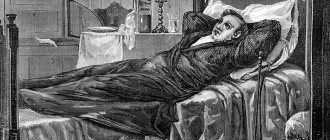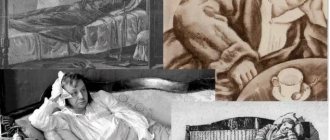From the middle of the 19th century to the last decade of the 20th. The novel "Oblomov" in the interpretation of director Mikhail Umanets turns into the soap opera "Wreckage". Full immersion into the world of television of the 1990s: the performance begins with a pre-filmed musical intro and is interrupted from time to time by a commercial break, of course, at the most interesting moment. Specially filmed short videos are playing on the screen in the spirit of couch shopping, which flooded onto Russian television in the 90s along with TV series.
The next time you can watch the performance is on January 17 and 18, and while waiting for the next show, you can find out how it turned out.
What is the main reason for Oblomov’s inactivity?
Grade 10
Essays on Russian literature
What is the main reason for Oblomov’s inactivity?
“Oblomov” appeared in the context of the rise of the democratic movement and was of great importance in the struggle of the advanced circles of Russian society against serfdom.
In the novel, Goncharov criticized the backward, inert and stagnant morals inherent in the feudal-serf order, which gave rise to Oblomovism: “I tried to show in Oblomov how and why our people turn before their time into... jelly.”
The essence and origin of Oblomovism are revealed in the novel from an anti-serfdom, democratic point of view. The author seeks to prove that Oblomov was turned into jelly, into a “kvass” by the serf environment.
Goncharov showed that Oblomovism arose on the basis of the ownership of “baptized property”, “three hundred Zakharovs”, that Oblomov was raised by a noble estate with its stagnant life. Ilyusha himself, like most of the inhabitants of Oblomovka, is a kind and good-natured person.
note
But, according to Dobrolyubov, “the vile habit of receiving satisfaction of his desires not from his own efforts, but from others, developed in him apathetic immobility and plunged him into a pitiful state of moral slavery.
This slavery is so intertwined with Oblomov’s lordship, so they mutually penetrate each other and are determined by one another, that it seems there is not the slightest possibility of drawing any boundary between them.”
Apathy and immobility are reflected by Goncharov even in the appearance of Ilya Ilyich Oblomov - a pampered, flabby man beyond his years who has “slept his ailments.”
As a child, everyone instilled in Oblomov the idea of his exclusivity. He studied at a boarding school, but was unable to serve. The hero dreams of traveling to contemplate masterpieces, and demonstrates his exclusivity to the wretched and primitive Zakhara.
In Oblomov, a living mind, purity, kindness, truthfulness, meekness, humanity towards inferiors, a tendency to introspection and self-criticism, and a sense of justice are ruined. The hero is mired in selfishness, which sweeps away all the good qualities that Oblomov does not feel the need to develop in himself.
This is evidenced by his “mental” plan for reforms in Oblomovka, expressing the infantilism, archaism and conservatism of his views on life. It is clear that Oblomov depends on Zakhar more than Zakhar depends on him.
Oblomov’s moral slavery lay in the fact that, picturing for himself the ideal of unbroken and noble idleness, a carefree and free landowner’s life, supported by the labor of serfs, he did not see anything strange in receiving quitrent from serfs and even, despite his complacency, “invented a new measure, stricter, against the laziness and vagrancy of the peasants.” But he did not ask himself questions about “his relationship to the world and to society,” taking advantage of his rights, he did not think about responsibilities, so “he was burdened and bored with everything he had to do.” “Work and boredom were synonymous for him,” and Oblomov quite rightly explained his inactivity and worthlessness by the fact that he was a nobleman.
A manifestation of Oblomovism was also morbid dreaminess, expressed in Manilov-like fantasies that overwhelmed Oblomov, who was lying on the sofa.
Important
Impracticality and helplessness are characteristic features of Oblomov: “I don’t know what corvée is, what rural labor is, what a poor man means, what a rich man means; I don’t know what a quarter of rye or oats means, what it costs, in what month, and what they sow and reap, how and when they sell it... I don’t know anything.” This ignorance was a typical feature of the majority of the noble intelligentsia of the 40s.
Oblomov’s whole life is a terrible, depressing process of gradual spiritual and moral impoverishment of the human personality, the transformation of a living person into a dead soul. Oblomov's childhood instilled sybaritism and passivity.
He studied at the university, was interested in literature, then served, even conceived a scientific work dedicated to Russia, but it all ended in Oblomovism. “His life was on its own, and his science was on its own. His knowledge was dead... His head represented a complex archive of dead deeds, faces, eras, figures, religions...
It was like a library consisting of only scattered volumes on different parts of knowledge.”
If a person is raised by “three hundred Zakharovs,” then this will definitely have negative consequences. This is exactly how Oblomov was brought up, this is clearly shown in the chapter “Oblomov’s Dream.” The landowner-estate life with which Ilya Ilyich’s childhood was associated is painted not only with negative colors; “kind” and “happy” people lived in Oblomovka.
Goncharov contrasts the quiet patriarchal village with the noisy, callous and cold capital, and says that some moral values preserved in Oblomov have a rural, rather than a city source. But “Oblomov’s Dream” is not a fairy tale about heavenly life and not an ideal of a simple-minded, good-natured and serene existence.
Here the social and simply human ugliness of Oblomov’s existence is clearly visible.
“Three hundred Zakharovs” kill all activity in the boy. Oblomovka’s patriarchal isolation, at first touching, not frightening, but cheerfully surprising with its exclusivity, then frightens. Oblomov’s gentleness in the complex world of social inequality turns into very real evil.
Oblomov’s landowner origins remain not only in his everyday habits; in this regard, Ilya Ilyich is more like Zakhar’s servant than a master. Estate penetrated deeply into Oblomov’s consciousness. His dreams and plans are fruitless, but there is a social side to them: Oblomov “came up with a new measure, stricter, against the laziness and vagrancy of the peasants.”
Oblomov’s doing nothing is not an innocent thing at all. Dobrolyubov remarked: “As long as he’s lying alone, that’s all right; and when Tarantyev, Zaterty, Ivan Matveich comes... what disgusting nasty things begin around Oblomov.
Advice
They eat him up, get him drunk, get him drunk... they ruin him in the name of the peasants... He endures all this in silence.” The critic concludes: “No, you can’t flatter the living like that, but we are still alive, we are still Oblomovs.
Oblomovism never left us.”
There is a lot of drama in Oblomov’s life story: he was not completely devoid of spiritual and moral life, he had some good aspirations and qualities, and it was not for nothing that Olga fell in love with the hero for his “dovelike meekness” and moral purity.
In his judgments, Oblomov often shows a critical attitude towards the bureaucracy of officials and the emptiness of secular society. Goncharov himself treats his hero with a considerable amount of sympathy when Oblomov awakens to the consciousness of his gradual fall.
Goncharov conveys his internal monologue: “He painfully felt that some good, bright beginning was buried in him, as in a grave, perhaps now dead, or it lay like gold in the bowels of a mountain, and it was high time this gold should be a walking coin.
But the treasure is buried deep and heavily with rubbish and alluvial debris.”
The melancholy mood that sometimes overcame Oblomov testified that he had real human feelings, sometimes resisting Oblomov’s inexorable attitude.
In his novel, Goncharov reveals the pernicious influence of the terrible, man-sucking mire of serfdom, the lack of labor, business, spiritual interests, and the parasitic existence of the landowner class.
Oblomov and Oblomovism (based on the novel “Oblomov” by I. A. Goncharov) (Second version)
It started with the inability to put on stockings,
but it ended in inability to live.
I. Goncharov. Oblomov
“Oblomov” is the best novel by I. Goncharov, on which the author worked for ten years.
In this novel, Goncharov not only vividly depicted the problems of contemporary life, but also drew conclusions about the causes of these problems, expressed his beliefs and hopes.
Thanks to the depth of this work, the name of the main character eventually became a household word, and the word “Oblomovism” itself began to express a very definite, almost philosophical concept.
Oblomov himself in the novel is not a doll, not a mechanism, but a living person with his own advantages and disadvantages.
note
A young, intelligent, educated, deeply decent, kind, gentle man became a victim of “Oblomovism” - upbringing, social environment - and it is because of this that his fate can be called tragic. Oblomov asks himself the question: “Why do I...
like this,” and the answer can be found in the hero’s childhood, in his past, since in his real life practically nothing unexpected happens, except for Oblomov’s intense internal struggle with himself, in which he is ultimately defeated.
Finding ourselves in the hero's dream, we have the opportunity to be transported to his childhood, to get acquainted with his parents, with the way of life in the fertile Oblomovka of the past.
We see Ilyusha Oblomov not as Ilya Ilyich became, spending whole days on the sofa. A curious and attentive boy observes everything that is happening in the house, “feeds his soft mind with living examples and unconsciously draws a program for his life based on the life around him.”
And what he saw around him “was some kind of all-consuming, invincible sleep, a true likeness of death.” No one was ever in a hurry or in a hurry in Oblomovka, did not make any effort even to carry out the most pressing and necessary things: “life, like a calm river, flowed past them.”
Ilyusha’s endless desire to understand the world around him was always thwarted by the nanny, who was obliged to make sure that nothing happened to the child, and who did not take her eyes off him.
Only during the afternoon nap was Ilyusha freed from the control of others, since everyone around him was sleeping, but no one could or wanted to explain to him anything that interested his inquisitive mind, since only good food and sound sleep were considered important in the house.
Ilyushin’s desire for independence was not only not encouraged, but also angrily suppressed by his parents, because numerous Vaskas, Vankas and Zakharkas were always at his service.
Important
The idea of work, of independent action, of initiative always disgusted the Oblomovites, because work was their main enemy, a punishment imposed “on our forefathers.”
Using every slightest opportunity, in Oblomovka they got rid of work, “finding it possible and necessary.”
So a curious, energetic, dexterous child grew up in an atmosphere of overprotection, like a hothouse flower, learning from those around him a calm and lazy, apathetic and inactive life.
So he himself began to have a hostile attitude towards the new, and he found the basis for his own impracticality and the inactivity of those around him not in real life, which was closed from him, but in nursery tales about Emelya the Fool, who does nothing on his own, but receives from a magic pike the fulfillment of various desires.
Fairy tales, legends, and superstitions were so deeply rooted in Oblomov’s heart that, as he grew up, he often felt sad about “why a fairy tale is not life, and life is not a fairy tale.”
Excessive care of parents, worried that Ilyusha ate well and on time, did not overwork during training, did not overexert himself from independent efforts, the lack of the need to do at least something himself, and not command and shout at the servants, formed a difficult, apathetic, the lazy and indecisive nature of Ilya Oblomov. His misfortune was that he himself did not know what he could do and what he could not do, and this ignorance made him helpless in solving even simple everyday issues.
Oblomovism crippled the fate of the main character, and it also destroyed him, since it did not allow him to prove himself either in friendship or in love.
And this was very painful for Oblomov himself, who “painfully felt that some good, bright beginning was buried in him, as in a grave, perhaps now dead...” Material from the site //iEssay.
ru
Advice
And yet it seems to me that Oblomov managed to rise above Oblomovism, if only by the fact that, while remaining its victim, he was a thinking victim, appraising and self-critical, with developed feelings and a rich soul.
The sense of self-worth and inner freedom that attracted both Olga and Stolz to the main character do not leave us indifferent. And yet Oblomov’s trouble lies in the force of habit, in the fact that in his life “no fire, neither salutary nor destructive, ever lit up.” Or maybe he simply did not notice this flame, extinguishing the divine spark given to him from above?
The merit of Goncharov, and after that of Dobrolyubov with his article “What is Oblomovism” is that they showed the typicality of Oblomovism, which is alive to this day.
Therefore, Ilya Ilyich will be right when sharing his thoughts with Stolz: “Our name is legion.”
I think that every person himself must overcome this poisonous phenomenon of Oblomovism, which drowns out the will and strength of spirit for the sake of peace and serene well-being.
On this page there is material on the following topics:
- Oblomov and Oblomovism essay conclusion
- composition of Oblomov and Oblomovism
- Oblomov is a very kind person examples from the text
- Oblomov himself is not a doll in the novel
- essay by them to us Legion Ostrovsky Oblomov
Source: https://iessay.ru/ru/writers/native/g/goncharov/sochineniya/oblomov/oblomov-i-oblomovshhina-po-romanu-i.-a.-goncharova-oblomov-vtoroj-variant
Stolts, Olga, Zakhar and the computer
An ordinary city apartment - a little shabby and not very comfortable. There is a minimum of furniture, the most important thing is a sofa and a computer in the center of the room. Everything is wrapped in bubble wrap, apparently not removed due to laziness after moving long ago. The slacker Ilya Oblomov lives here. He doesn't work, doesn't study, and doesn't really care about the mess around him. There is an estate somewhere far away, but Ilya is too lazy to take care of it. And there’s no time: he plays Tetris all day and night.
This game - also one of the symbols of the time - at some point becomes part of the scenery. The debris referred to in the title of the play are figures that the player must line up.
“These recognizable figures, parts and debris make up a wall that is very easy to destroy, just like the life of Oblomov himself. This is facilitated, of course, by Ilya’s endless advisers, who for some reason know what’s best for him. If it weren’t for this interference in his life, maybe everything would have been completely different,” explains Mikhail Umanets.
The good-natured Zakhar lives with Oblomov - no longer a servant, but just a neighbor, and not an old man, but a peer. He is either a distant relative of the main character, or a friend who does housework for the opportunity to live in an apartment for free.
Staging the play “Wreckage” was the idea of Mikhail Umanets, not only the director, but also one of the leading actors of the “School of Dramatic Art”. After “Pushkin’s Journey to Africa,” which premiered last season, Umanets decided to turn again to Russian classics.
“I wanted to reread Oblomov,” he says. — At school I categorically did not like this character. I considered him a lazy person who was waiting for someone to come and decide and do everything for him. But now it seemed to me that there was something more to him than just laziness.”
Umanets retained the original plot in the production, but added a small detective line to it. Actor Arkady Kirichenko plays two characters: a Catholic pastor (he was transformed into a faceless man from the novel named Alekseev) and the main villain Ivan Mukhoyarov, who forces Oblomov to sign the fatal loan letter. The changes affected the images of Oblomov’s beloved Olga, as well as his friend Stolz. In the play they have a profession.
“I remembered that in TV series a hero similar to Stolz is most often some kind of doctor. And then I realized that Olga should work in his clinic. I suggested to Alina Khojevanova, who plays her, not to embody the delicate nature that emerges in the novel, but a strict, purposeful woman doctor who knows what she wants from life. Our Olga doesn’t have her head in the clouds,” says the director.
Why can’t Oblomov be called a negative character?
Works › Goncharov I.A. › Oblomov
Ready Homework
Ilya Ilyich Oblomov, the main character of I.A. Goncharov’s novel, is a collective image of Russian landowners. It presents all the vices of noble society during the times of serfdom: not just laziness and idleness, but taking it for granted.
Ilya Ilyich spends whole days in inactivity: he does not even have a government job, does not go to the theater, does not go to visit. It would seem that a person living such a useless life cannot be called anything other than a negative hero.
But even at the beginning of the novel, Goncharov makes it clear to us that this is not so: Oblomov mentions Andrei Stolts, his childhood friend, who more than once helped out Ilya Ilyich and settled his affairs.
note
If Oblomov had represented nothing of himself as a person, then with such a lifestyle he would hardly have maintained such a close friendship with Stolz.
“There is Oblomov in everyone”
For the first time, fragments of “Wreckage” were shown at the “Three Stages of Laboratory” festival of young directors, which takes place at the “School of Dramatic Art” every year. The most successful productions from the festival program are included in the theater's repertoire. Work on the play, including showings at the Three Stages of the Laboratory, lasted more than a year.
“It was very interesting for me to analyze and work through the psychological lines of all the characters with the guys, to figure out their relationships with each other,” said Mikhail Umanets.
According to him, there were some disputes. First of all, they concerned the characters of the heroes. Playing Olga is Alina Khojevanova’s long-time dream. The actress saw her heroine as dreamy and vulnerable.
“She is a very sensitive, loyal, dedicated person, and I have a lot in common with her,” she says. “She’s an idealist and she’s paying for it.” The director saw her differently, iron, strict. And for me this is very difficult. During rehearsals, I did a great job, and Mikhail made sure that I did not deviate from the given image.”
Sergei Melkonyan reincarnated as Andrei Stolts, who protected Oblomov.
“I have sympathy for Stolz, despite the fact that he does not allow Ilya to live in peace, even with the best intentions,” he says. “He takes responsibility for his whole life and suffers because he cannot help him. I think that my hero, deep down in his soul, is an unhappy person, disliked by his father, and he transfers this unreceived love to Oblomov.”
Actor Maxim Maminov, who played the main role, is convinced that Oblomov is in each of us.
“Anyone can fall into some kind of procrastination. We think: “I can do this, but later, but now I want entertainment.” Ilya is the same. This is a good and kind person, but very lazy. I think if I were him, I would start to move at least a little, but he completely gives up and cannot get out of this state,” he said.
Essay based on the novel by Oblomov
Essay based on the novel “Oblomov”
Author: Goncharov I.A.
Essay based on the novel “Oblomov”
“Ilya Ilyich’s lying down was neither a necessity, like that of a sick person or like a person who wants to sleep, nor an accident, like that of someone who is tired, nor a pleasure, like that of a lazy person: it was his normal state.”
I. A. Goncharov.
The novel “Oblomov” was written by I.A. Goncharov in 1859 and immediately attracted the attention of critics with the problems posed in the novel. “Oblomov” is a socio-psychological novel depicting the destructive influence of the noble-landowner environment on the human personality. The author depicted Russian life in the first half of the 19th century, which he observed from childhood, with objective accuracy and completeness.
The main character of the novel is Oblomov Ilya Ilyich - a man of thirty-two or three years old, of average height, pleasant appearance, with dark gray eyes, but with the absence of any definite idea, any concentration in his facial features.
The plot of the novel is the life path of Ilya Ilyich, from childhood until his death.
Advice
The main theme of the novel is “Oblomovism” - a way of life, a life ideology; This is apathy, passivity, isolation from reality, contemplation of life around oneself, but the main thing is the absence of work, practical inactivity.
The concept of “Oblomovism” is not only applicable to Oblomovka with its inhabitants; it is a “reflection of Russian life”, the key to unraveling many of its phenomena.
In the 19th century, the life of many Russian landowners was similar to the life of the Oblomovites, and therefore “Oblomovism” can be called the “dominant disease” of that time.
The essence of “Oblomovism” is revealed by Goncharov through the depiction of Oblomov’s life, most of which the hero spends lying on the sofa, dreaming and making all sorts of plans.
The upbringing and atmosphere in which little Oblomov grew up played a huge role in the formation of his character and worldview.
Ilya Ilyich was born in Oblomovka - this “blessed corner of the earth”, where “there is nothing grandiose, wild and gloomy”, there are “no terrible storms, no destruction”, where deep silence, peace and imperturbable calm reign. On the Oblomov estate, the midday “all-consuming, invincible sleep, a true likeness of death” was traditional.
And little Ilyusha grew up in this atmosphere, was surrounded by care and attention: his mother, nanny and the entire numerous retinue of the Oblomov family showered the boy with affection and praise. The slightest attempt by the child to do anything on his own was immediately suppressed: he was often forbidden to run anywhere, and at the age of fourteen he was not even able to dress himself.
Thus, Ilya Ilyich became more and more “saturated with Oblomovism,” and an ideal of life gradually formed in his mind. Already an adult Oblomov was characterized, in my opinion, by childish daydreaming.
note
Life in his dreams seemed to him calm, measured, stable, and his beloved woman - in her qualities more reminiscent of a mother - loving, caring, sympathetic. Oblomov was so immersed in the world of his dreams that he completely broke away from reality, which he was unable to accept.
But the habit of receiving satisfaction of his desires not from his own efforts, but from others, developed moral slavery in him.



